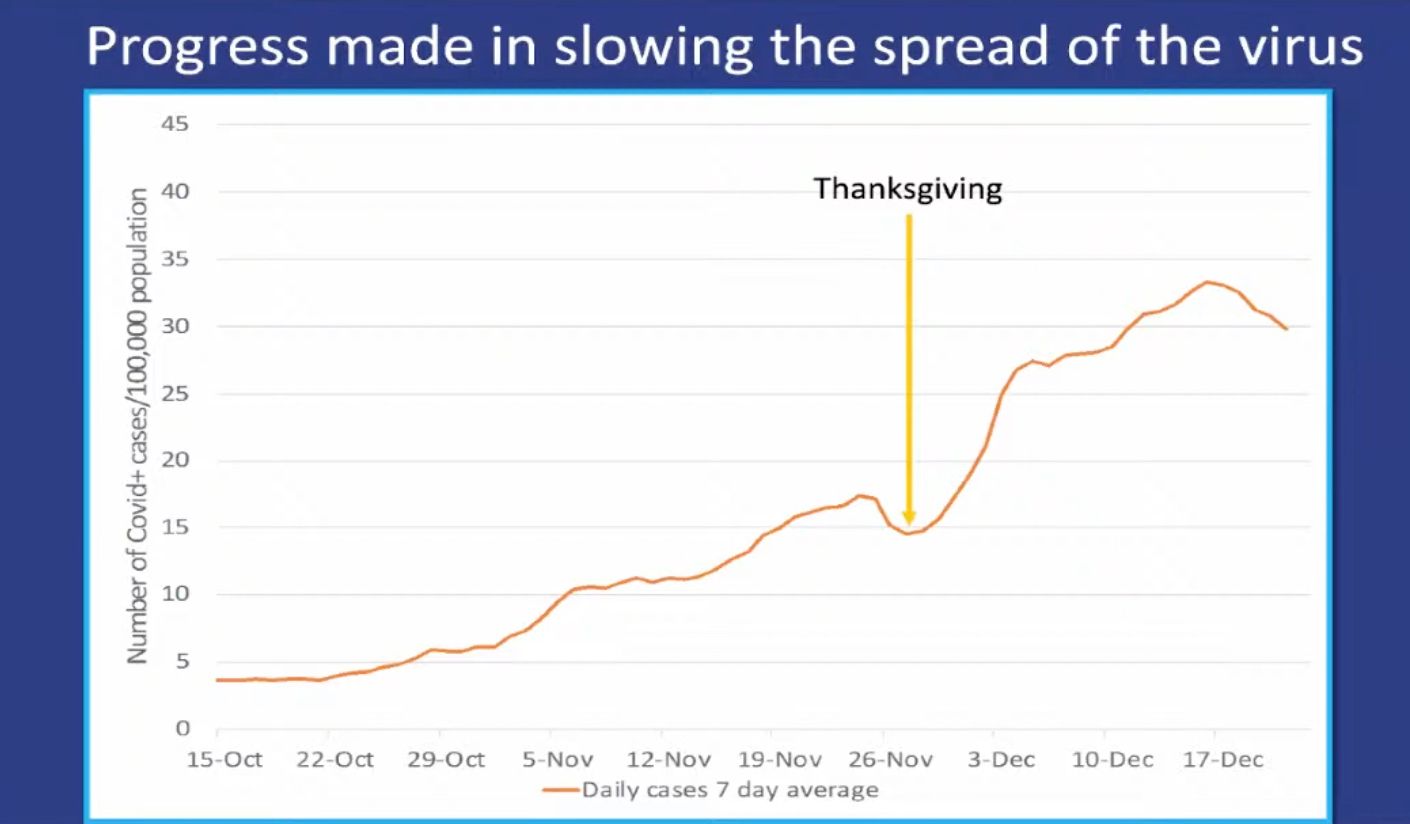Both daily new case totals and hospitalizations may be peaking or nearing a peak in San Francisco, indicating a possible — possible! — reprieve in the current surge. And SF's Director of Public Health Dr. Grant Colfax wants everyone to know he's proud of you.
The tone of these weekly COVID press briefings by the City of San Francisco has oscillated wildly the past eight months between intense, horrific predictions of the near future to calm reassurance and congratulations for social distancing well done. Tuesday's briefing, in which Colfax addressed reporters and the public without Mayor London Breed, was in the latter category, and Colfax is starting to sound more cautiously optimistic than he was even last week about the next month or two — at least in SF.
"I'm here to report our collective progress in beating back the current surge in COVID-19 in San Francisco," Colfax began. "As we look back on this difficult year of 2020, I want to thank all San Franciscans for your incredible efforts during these past months — months that were unimaginable just a year ago as reports of this virus first surfaced."
Today, the data suggests that daily new cases in SF, while still about three times higher than they were at the beginning of December — 30 per 100,000 people vs. 9 per 100,000 people on December 4 — are starting to level off. And while Colfax cautions that we are still "far from out of the woods," he's at least not sounding as stern and dour as he did just a couple weeks back.

"We are seeing some reasons for hope, but we are still in a precarious position," Colfax said.
He notes that ICU bed availability is hovering around 9 percent around the Bay Area — that is down from the weekend when it was around 11 percent. And San Francisco's COVID hospitalizations are just around 200, with the sharp rise in cases in recent weeks suggesting that many more people will be showing up in need of hospitalization in the coming weeks.
But the reproductive rate (Re) of the virus slid down since the first week of December such that the direst of predictions about hospitals getting overwhelmed may not come to pass. As of December 26, the Re was 1.13, down from an estimated 1.45 on December 5 — which means that instead of seeing a peak in hospitalizations around mid-February with some 1,500 COVID patients in hospitals, if things remained steady, hospitalizations will peak at 290 patients in mid-February. If, in the next few days, the Re rate dipped below 1.0, Colfax explained, it would mean that the city's peak in hospitalizations would happen by January 4, and only 68 additional deaths would occur through April, versus 108 at the current rate.

Social gatherings remain a primary driver of viral spread — much moreso than retail activities or most other things besides frontline work.
Colfax said the city will not know where things stand in terms of case counts stemming from holiday gatherings until the first weeks of January — January 2 we may see evidence of Christmas gatherings, and by January 8, we may begin seeing evidence stemming from New Year's Eve gatherings.
Despite the drama surrounding the stay-at-home orders, San Francisco has continued to have one of the lowest case counts and death rates of any major city in this pandemic. San Francisco is second only to Seattle right now when it comes to metropolitan areas with low numbers of daily new cases per 100,000 — SF's number was 27.2 as of Monday, while Seattle's was 18.5. And as the Chronicle reports, Seattle's November-December surge subsided faster than it has here, with over 900 new cases reported on December 4, and 104 new cases on December 26.
Colfax raised the issue of the new coronavirus variant detected in the United Kingdom that seems to have the ability to infect people more readily. On Tuesday, as the Washington Post reports, federal scientists say they've confirmed the presence of the variant in the U.S. in a patient in Colorado with no travel history. The lack of any travel or known contact with an infected person means that the variant is likely widely present here and just hasn't been detected, the scientist said, and "we can expect that it will be detected elsewhere."
Colfax said that the same efforts to stop the spread will work against the variant. And, he added, "As we learn more [about the variant], we will adjust our efforts, as we have during this pandemic."
You can watch the entire briefing below.

